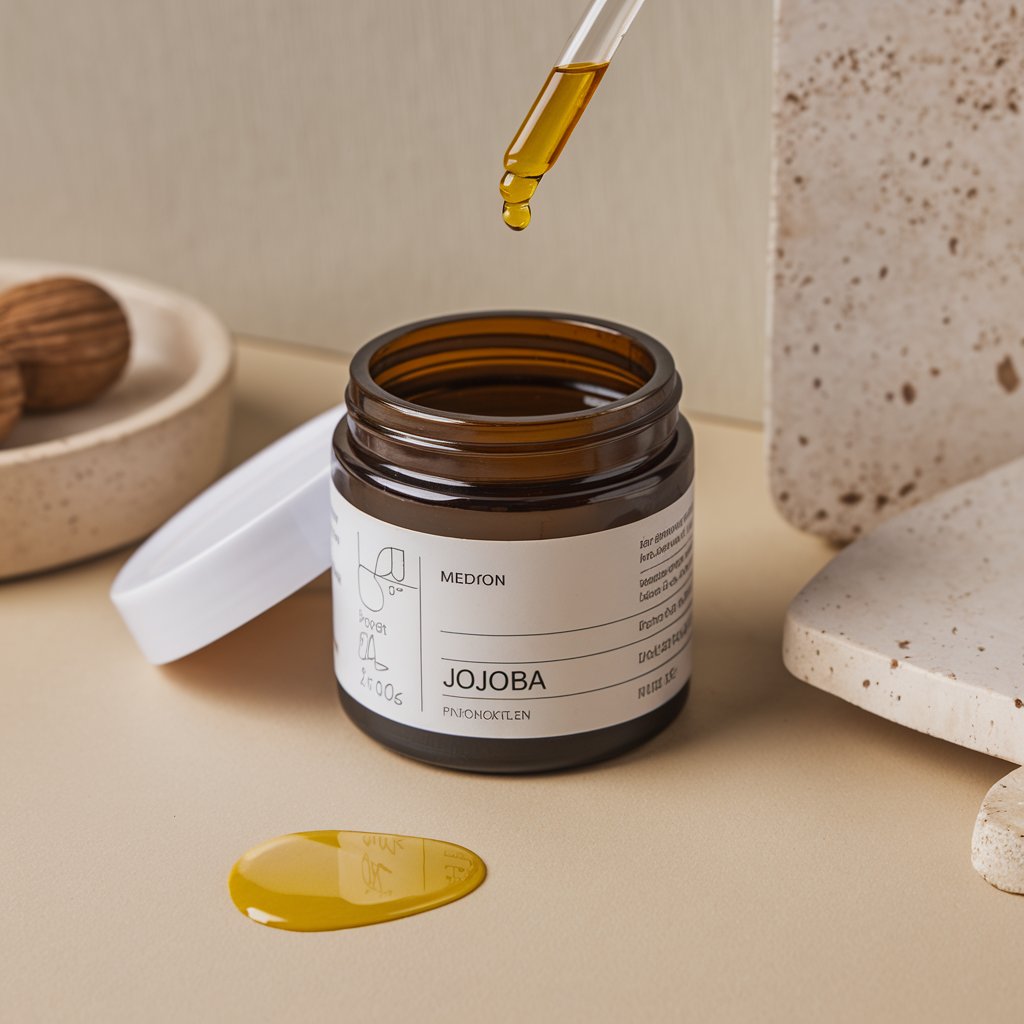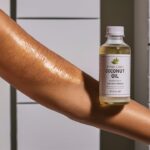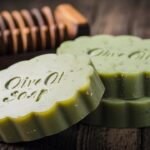- Jojoba oil is non-comedogenic, with a low rating of 2 on the comedogenicity scale.
-
Dermatologists recommend it for balancing oil production and moisturizing without clogging pores.
-
Research shows jojoba oil can reduce acne lesions and has anti-inflammatory and wound-healing properties.
-
Use jojoba oil sparingly, perform a patch test, and monitor your skin’s reaction.
With its rise in jojoba oil’s popularity, one common question keeps surfacing: does jojoba oil clog pores? If you’re hesitant to use this oil because you’re worried about breakouts or clogged pores, you’re not alone. Let’s explore the science behind jojoba oil and whether or not it’s truly pore-clogging.
Click Here to View our Pore Clogging Ingredient Checker
What is Jojoba Oil?
Derived from the seeds of the jojoba plant (Simmondsia chinensis), this golden liquid is technically not an oil but a wax ester. Wax esters closely resemble the natural oils (sebum) our skin produces, which is why jojoba oil is often referred to as being “skin-friendly.”
Jojoba oil’s chemical structure mimics the skin’s natural sebum more closely than any other plant-based oil. Because of this, many people believe it can help balance oil production and even treat acne. But does it cause congestion and clog pores? Let’s find out!
Jojoba Oil and the Skin’s Natural Balance
When you apply jojoba oil, your skin’s sebaceous glands reduce their production of sebum. This can be beneficial for people with oily skin, as it may help prevent excess oil buildup that can clog pores and lead to acne.
Moreover, since jojoba oil is non-comedogenic (meaning it doesn’t block pores), it’s often recommended for those with acne-prone skin. According to the comedogenicity scale, jojoba oil has a rating of 2 out of 5, which means it has a low risk of clogging pores. This makes it one of the safer oils to use for skincare, especially if you’re prone to breakouts. But while the rating is low, everyone’s skin is different.
Is Coconut Oil Really Clogging Your Pores? The Truth Uncovered
Dermatologist Insights: What Do Experts Say?
Dermatologists often recommend jojoba oil for a wide range of skin types. The consensus is that jojoba oil has a relatively low risk of clogging pores compared to other oils. Here’s what some experts have to say:
Dr. Audrey Kunin, a dermatologist and founder of DERMAdoctor, highlights that jojoba oil’s structure is similar to the skin’s natural oil, which helps it penetrate deeply without causing blockages.
Dr. Joshua Zeichner, another well-known dermatologist, praises jojoba oil for being lightweight and non-irritating, making it suitable for sensitive and acne-prone skin types. He emphasizes that jojoba oil can provide a protective layer over the skin without contributing to pore congestion.
Because of its lightweight nature, jojoba oil can be used as a carrier oil in various skincare routines. Dermatologists agree that while jojoba oil is less likely to clog pores, individual reactions may vary depending on skin type and sensitivity.
User Experiences: Real Stories from Skincare Communities
The skincare community often swears by jojoba oil as a staple product for a glowing complexion. However, not everyone has the same experience. Let’s take a look at both sides.
Positive Experiences:
Many users with acne-prone skin report that jojoba oil has helped them reduce breakouts over time. They appreciate its ability to hydrate without making their skin feel greasy.
For example, some users on Reddit’s SkincareAddiction thread say they were initially hesitant to use jojoba oil because of its “oil” label. But after consistent use, many found it improved their skin texture and helped to manage oil production. A lot of these users also noticed fewer breakouts when using jojoba oil as a facial moisturizer or makeup remover.
Negative Experiences:
Despite its popularity, not all users have a positive experience with jojoba oil. Some individuals find that after prolonged use, their skin reacts by becoming more congested or breaking out in small bumps. This tends to happen more for people with particularly sensitive skin or those using the oil in large amounts.
While jojoba oil is often tolerated well, it’s clear that individual reactions can vary. If you notice an increase in clogged pores or breakouts after using it, you might need to adjust the amount or frequency of use.
Scientific Studies on Jojoba Oil
When it comes to understanding whether jojoba oil clogs pores, science provides a clearer picture. A few key studies highlight jojoba oil’s potential benefits for acne and skin health:
A 2012 Study on Acne and Jojoba Oil: A study published in the Journal of Ethnopharmacology tested the effects of jojoba oil on individuals with mild to moderate acne. The participants applied a clay jojoba oil mask 2-3 times per week for six weeks. The results showed a 54% reduction in acne lesions, suggesting that jojoba oil may help in treating acne due to its anti-inflammatory and healing properties.
Antimicrobial Effects: Some studies also point to jojoba oil’s antimicrobial properties. This means it can potentially inhibit the growth of bacteria on the skin, including those that cause acne. These properties, combined with its lightweight texture, reduce the likelihood of clogged pores.
How to Use Jojoba Oil Without Clogging Pores
To minimize any chance of clogged pores, it’s essential to use jojoba oil the right way. Here are a few tips:
-
Start with a Patch Test: Even though jojoba oil is generally considered safe, everyone’s skin reacts differently. Test a small amount on your jawline before using it all over your face to see how your skin responds.
-
Use Sparingly: A little goes a long way! Apply a small amount to your skin. Over-application can potentially overwhelm your skin, leading to congestion.
-
Combine with Other Products: If you’re nervous about using pure jojoba oil, consider adding a few drops to your favorite moisturizer instead. This dilutes the oil while still delivering its benefits.
-
Avoid Heavy Layering: Avoid combining jojoba oil with other heavy oils or comedogenic products. Layering too many products can increase the risk of clogged pores, especially if you’re prone to acne.
Who Should Avoid Jojoba Oil?
While jojoba oil has a reputation for being suitable for most skin types, there are a few exceptions. People with extremely sensitive skin or conditions like rosacea might experience irritation or small breakouts. If this happens, it’s best to stop using the oil and consult a dermatologist to find alternative products.
Additionally, those who prefer non-oil-based skincare routines might want to skip jojoba oil altogether, as some individuals simply don’t respond well to oils in general. Again, it’s all about how your skin reacts.
Conclusion: Does Jojoba Oil Really Clog Pores?
The short answer: No, jojoba oil generally does not clog pores. With its lightweight, non-comedogenic properties, jojoba oil is safe for most people, including those with acne-prone skin. Its unique similarity to the skin’s natural sebum allows it to hydrate and balance the skin without causing breakouts in most cases.
However, skin care is highly personal. What works for one person may not work for another, and individual results will vary. So, if you’re interested in trying jojoba oil, start slow, monitor your skin’s reaction, and adjust as needed.

I’m a devoted organic skincare enthusiast, passionate about the natural, wholesome goodness that organic products bring to our skin.
Organic skincare isn’t just a hobby for me—it’s a lifestyle. Every product I use, recommend, and write about has been carefully chosen for its purity and effectiveness. Everything I write about is backed by scientific studies, dermatologists’ opinions, and user experiences.
I also excel at tackling skincare challenges with innovative, organic solutions.


